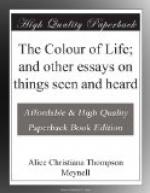Frost was surely at work in both cases, and in both it wrought wrong. There is a similarity of unreason in betraying the death of a bird and in exhibiting the death of Shelley. The death of a soldier—passe encore. But the death of Shelley was not his goal. And the death of the birds is so little characteristic of them that, as has just been said, no one in the world is aware of their dying, except only in the case of birds in cages, who, again, are compelled to die with observation. The woodland is guarded and kept by a rule. There is no display of the battlefield in the fields. There is no tale of the game-bag, no boast. The hunting goes on, but with strange decorum. You may pass a fine season under the trees, and see nothing dead except here and there where a boy has been by, or a man with a trap, or a man with a gun. There is nothing like a butcher’s shop in the woods.
But the biographers have always had other ways than those of the wild world. They will not have a man to die out of sight. I have turned over scores of “Lives,” not to read them, but to see whether now and again there might be a “Life” which was not more emphatically a death. But there never is a modern biography that has taken the hint of Nature. One and all, these books have the disproportionate illness, the death out of all scale.
Even more wanton than the disclosure of a death is that of a mortal illness. If the man had recovered, his illness would have been rightly his own secret. But because he did not recover, it is assumed to be news for the first comer. Which of us would suffer the details of any physical suffering, over and done in our own lives, to be displayed and described? This is not a confidence we have a mind to make; and no one is authorised to ask for attention or pity on our behalf. The story of pain ought not to be told of us, seeing that by us it would assuredly not be told.
There is only one other thing that concerns a man still more exclusively, and that is his own mental illness, or the dreams and illusions of a long delirium. When he is in common language not himself, amends should be made for so bitter a paradox; he should be allowed such solitude as is possible to the alienated spirit; he should be left to the “not himself,” and spared the intrusion against which he can so ill guard that he could hardly have even resented it.
The double helplessness of delusion and death should keep the door of Rossetti’s house, for example, and refuse him to the reader. His mortal illness had nothing to do with his poetry. Some rather affected objection is taken every now and then to the publication of some facts (others being already well known) in the life of Shelley. Nevertheless, these are all, properly speaking, biography. What is not biography is the detail of the accident of the manner of his death, the detail of his cremation. Or if it was to be told—told briefly—it




